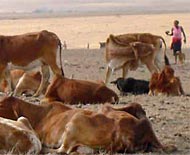Future Now
The IFTF Blog
Environmental Health Drones
Via Make Magazine comes word of an aerial drone that inadvertently happened upon a meat packing plant in Dallas that was polluting a nearby river with pig blood. The disturbing finding points to something we should expect a lot more of, now that drones have been approved for public flight - namely, that we'll see citizens groups use unmanned vehicles as a form of citizen policing to monitor for all kinds of environmental health violations.
As reported in sUAS News:
A Dallas sUAS enthusiast testing his camera equiped drone noticed something awry with the images he had taken. Speaking to sUAS News he said.
I was looking at images after the flight that showed a blood red creek and was thinking, could this really be what I think it is? Can you really do that, surely not?
Whatever it is, it was flat out gross. Then comes the question of who do I report this to that can find out what it is and where it is coming from.
Search after search and even some phone calls and I am not finding anything on who to call until I find the Nation Response Center. With their website saying that they are “the sole national point of contact for reporting all oil, chemical, radiological, biological and etiological discharges into the environment, anywhere in the United States and its territories” this sure seems like the correct place to start.

The finding, which was by chance, reminds me of the concept of human flesh search engines that have taken off in China, where, in response to crimes, people use social media to identify and shame people who commit crimes.
Human-flesh search engines — renrou sousuo yinqing — have become a Chinese phenomenon: they are a form of online vigilante justice in which Internet users hunt down and punish people who have attracted their wrath. The goal is to get the targets of a search fired from their jobs, shamed in front of their neighbors, run out of town. It’s crowd-sourced detective work, pursued online — with offline results.
So what would environmental health drones do? Crowdsource environmental health detective work. Publicize, shame and boycott offenders.
(Thanks to colleagues Sean Ness and Nic Weidinger for pointing me to the Make article.)



